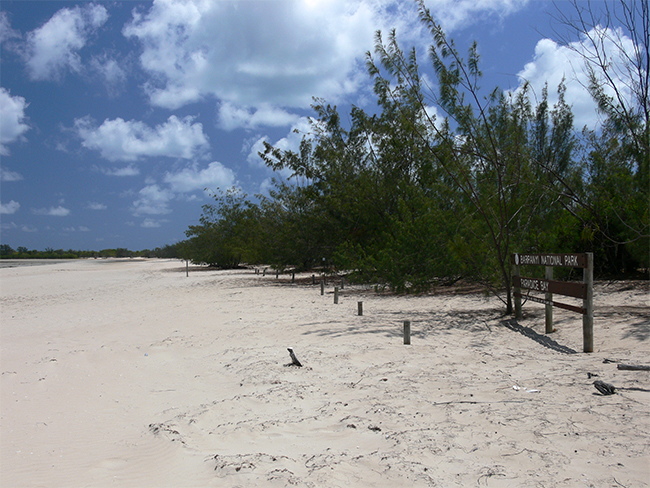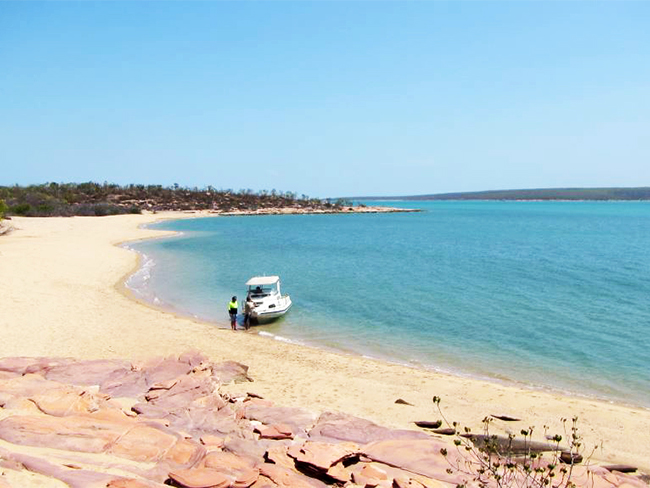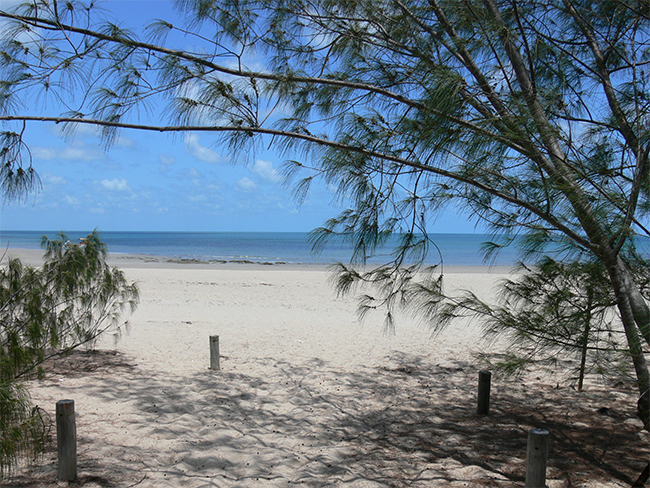Barranyi (North Island) National Park
Barranyi (North Island) National Park is the perfect spot for fishing.
It is part of the Sir Edward Pellew group of islands north of Borroloola and its waters are full of northern bluefin tuna, Spanish mackerel, Queenfish and trevally.
There are also reef delicacies such as the red emperor, coral trout, sea perch and parrot fish.
Sandstone cliffs, sweeping sandy beaches and small coves make up the picturesque coastline of the island, which is home to the Yanyuwa Aboriginal people.
You'll also see plenty of sea and land birds, especially at sunrise and sunset.
The beaches of Barranyi (North Island) National Park are important nesting sites for turtles.
You should not swim in this area due to saltwater crocodiles and box jellyfish. For more information on crocodile safety, go to the Be Crocwise website.
This park requires visitors to the NT to have a parks pass.
Get the Barranyi (North Island) National Park fact sheet and map PDF (773.5 KB).
Check if the park is open
Phone: 08 8973 8888
| Park sites | Status | Comments | Forecast opening |
|---|---|---|---|
| Barranyi (North Island) National Park | Open | - | |
| Paradice Bay Campground | Closed | No water, toilet facilities and no camping available due to infrastructure damage and pending weather conditions. | June 2025 |
| Paradice Bay Loop Walk Track | Closed | June 2025 | |
| Mud Bay Campground | Open |
Contact the Borroloola Ranger Station before you leave home on 08 8973 8888.
Access to the island is by boat only, with a 35km journey up the McArthur River and Carrington Channel to the Gulf.
Vessels at Borroloola can launch from King Ash Bay.
This journey is only recommended for experienced boaters as conditions can be dangerous during the Dry Season and severe winds are likely in the Wet Season.
Check road conditions before you go.
You can do all of the following activities in the park:
- fishing
- bushwalking
- camping
- boating
- wildlife spotting.
Bush sites are available at Mud Bay and Paradice Bay.
Paradice Bay has toilets and barbecues.
You will need to bring your own drinking water to the island.
Book before you go
You must book online and pay a fee to camp.
Do this before you go. You can't pay at the site.
Learn more about camping in parks and reserves.
If you plan to launch a boat in the park you should be aware of the following:
- access is restricted to Paradice Bay camping area, beach, loop walking track and the camping area at Mud Bay
- you should stay in your boat throughout the park to avoid disturbing one of the many sacred areas
- it is dangerous to land a boat on many beaches as they have reefs and strong currents and swells
- you should check weather conditions before setting out - south-easterly winds prevail during the Dry Season, making shallow waters very rough
- cyclones and regular storms are a feature of the Wet Season when north-westerly winds prevail
- register with the Borroloola Boat and Fishing Club before departing for Barranyi National Park, or tell a reliable person when you expect to return
- prepare for extremely remote conditions and be self-sufficient
- follow the safety guide for recreational boating.
Barranyi (North Island) National Park has all of the following facilities:
- information signs
- fire pits
- public toilets
- camping
- walking tracks
- boat ramp.
When visiting the park, remember all of the following:
- visitors to the NT require a parks pass
- drones are not permitted
- take all rubbish with you
- water is available, but is not suitable for drinking
- cultural items and wildlife are protected
- you must not go into the residential area of the traditional owners at Webe Point
- be careful with fire, only light fires in fireplaces provided
- do not use detergent and soap on or near the island
- observe all fishing laws
- pets are not permitted
- generators are not permitted
- nets, traps and firearms are not permitted
- camp only in designated areas
- check that your boat is not transporting pests like weeds and cane toads.
You can have a safe and comfortable trip to Barranyi by doing all of the following:
- do not swim
- carry and drink plenty of water
- carry a first aid kit
- wear a hat, sunscreen and insect repellent
- make sure your boat is well-maintained and equipped.
Give feedback about this page.
Share this page:
URL copied!


